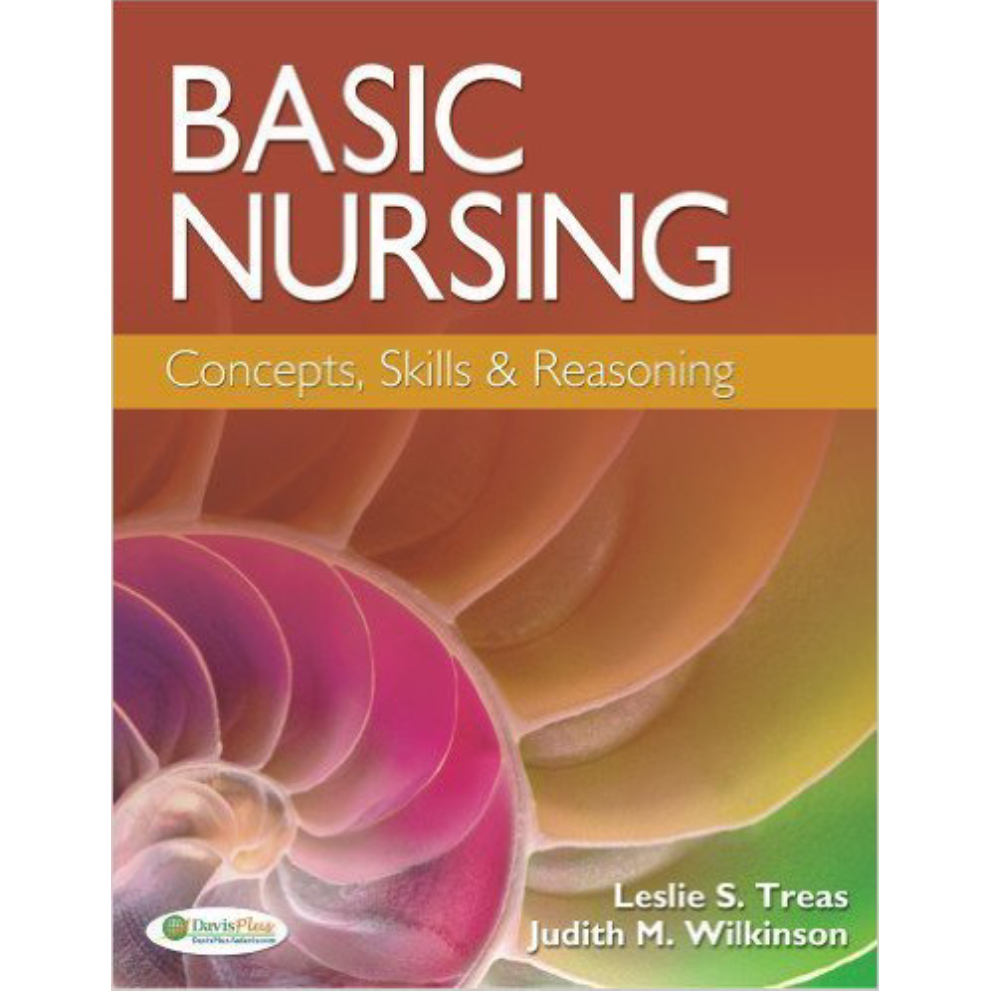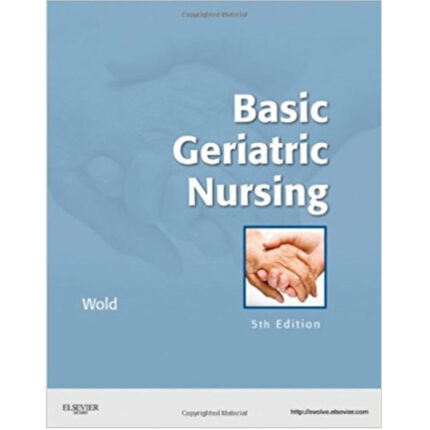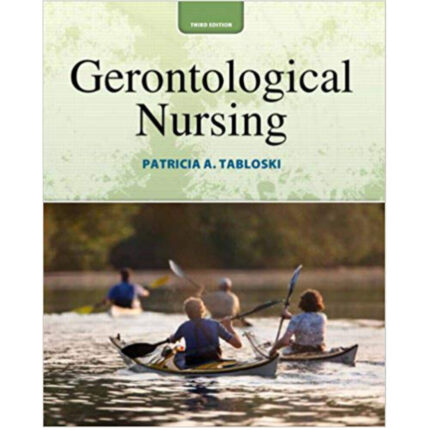Basic Nursing Concepts, Skills & Reasoning 1st Edition By Treas, Leslie S – Test Bank
Chapter 11. Experiencing Health & Illness
Multiple Choice
Identify the choice that best completes the statement or answers the question.
____ 1. In an effort to promote health, the home health nurse opens the client’s bedroom windows to let in fresh air and sunlight, washes her hands often, and teaches the patient and family about the importance of hygiene and cleanliness. This most closely illustrates the ideas of which of the following people?
1)
Jean Watson
2)
Jurgen Moltmann
3)
Florence Nightingale
4)
Robert Louis Stevenson
ANS: 3
Florence Nightingale believed that health was prevention of disease through the use of fresh air, pure water, efficient drainage, cleanliness, and light. Jean Watson believes that health has three elements: a high level of overall physical, mental, and social functioning; a general adaptive-maintenance level of daily functioning; and the absence of illness (or the presence of efforts that lead to its absence). Jurgen Moltmann believes that true health is the strength to live, the strength to suffer, and the strength to die. He also stated that health is not a condition of the body; it is the power of the soul to cope with the varying condition of that body. Robert Louis Stevenson wrote that health is not a matter of holding good cards; it is playing a poor hand well.
PTS: 1 DIF: Easy REF: p. 222
KEY: Nursing process: N/A | Client need: HPM | Cognitive level: Recall
____ 2. Which of the following is known to be a healthy strategy for coping with stress?
1)
Performing meaningful work
2)
Consuming simple carbohydrates
3)
Drinking three glasses of red wine each day
4)
Weight training
ANS: 1
Many individuals find that meaningful work is a healthy way to cope with stressors. Consuming simple carbohydrates is not a healthy way to cope with stress. Drinking more than one glass of red wine each day is considered unhealthy. Weight training has been shown to increase bone density and reduce the risk of osteoporosis and heart disease but not necessarily to reduce stress.
PTS: 1 DIF: Moderate REF: p. 225
KEY: Nursing process: N/A | Client need: PSI | Cognitive level: Application
____ 3. Which family would most likely be helpful in encouraging the client to experience a high level of wellness? A family who
1)
Controls feelings to avoid conflict
2)
Teaches negotiation skills and independence
3)
Encourages risk taking and adventure
4)
Views themselves as helpless victims
ANS: 2
Families who promote independence and teach good negotiation skills enable family members to experience a high level of wellness by thinking for themselves. In contrast, families who tend to squelch personal feelings to avoid conflict may not allow a high level of wellness. Families who emphasize caution in new situations are more beneficial than those who encourage risk-taking. Families who view themselves as capable and successful are more advantageous than those who view themselves as helpless victims.
PTS: 1 DIF: Easy REF: p. 225
KEY: Nursing process: N/A | Client need: PSI | Cognitive level: Recall
____ 4. The client is a 76-year-old man who is experiencing chronic illness. He has a genetic-linked anemia. He says he does not eat a balanced diet, as he prefers sweets to meat and vegetables. Which of the following dimensions of health can the nurse most likely influence by teaching and counseling him?
1)
Age-related changes
2)
Genetic anemia
3)
Eating habits
4)
Gender-related issues
ANS: 3
The nurse is most likely to influence the patient’s eating habits because those are the dimension over which he has the most control and, therefore, has the most potential for changing. Although people consider biological factors when they describe themselves as well or ill, they are not entirely within our control. Biological factors include age and developmental stage, genetic makeup, and sex.
PTS: 1 DIF: Easy REF: p. 224
KEY: Nursing process: Planning | Client need: HPM | Cognitive level: Application
____ 5. What type of loss is most common among patients who are hospitalized for complex health conditions?
1)
Privacy
2)
Dignity
3)
Functional
4)
Identity
ANS: 2
Hospitalized patients commonly experience the loss of dignity. Wearing a hospital gown, having their body exposed, invasive procedures, loss of control over body functions—all of these contribute to loss of dignity, and all are very common among hospitalized patients. Healthcare providers have a duty to protect privacy and confidentiality of patients, even though it is certainly threatened by some situations during hospitalization. Some patients lose functioning and identity during hospitalization, but they are not common occurrences.
PTS: 1 DIF: Moderate REF: p. 227
KEY: Nursing process: Assessment | Client need: PSI | Cognitive level: Comprehension
____ 6. A 62-year-old patient is admitted to the hospital with hypertension. Which question by the nurse is most important when performing the initial assessment interview?
1)
“What medications do you take at home?”
2)
“Do you have any environmental, food, or drug allergies?”
3)
“Do you have an advance directive?”
4)
“What is the greatest concern you are dealing with today?”
ANS: 4
It is most important for the nurse to ask the patient about his greatest concern. His concern can then be incorporated into the plan of care, making sure that his needs are met. Asking about medications, allergies, and an advance directive is also important but does not take priority over asking about the patient’s greatest concern.
PTS: 1 DIF: Moderate REF: p. 231
KEY: Nursing process: Assessment | Client need: PSI | Cognitive level: Analysis
____ 7. When developing goals, which guideline should the nurse keep in mind? Goals should be
1)
Realistic so that progress is recognized by the patient
2)
Developed solely by the healthcare team
3)
Developed without family input, to maintain confidentiality
4)
Valued by the multidisciplinary care providers
ANS: 1
Goals should be realistic so that progress is recognized by the patient. They should be valued by both the patient and family. The nurse should develop goals with input from the patient and his family.
PTS: 1 DIF: Moderate REF: p. 231
KEY: Nursing process: Planning | Client need: SECE | Cognitive level: Comprehension
____ 8. Which one of the following important nursing actions is a hospitalized patient likely to experience on an emotional level and remember long after this hospitalization has ended?
1)
Administering her medications according to schedule
2)
Allowing flexible visitation by her family and friends
3)
Explaining treatment options in terms she can understand
4)
Providing a healing presence by listening and being attentive
ANS: 4
The nurse can contribute meaningfully to the patient’s hospitalization by providing a healing presence. The nurse can do this by listening to the patient and being attentive. Administering medications according to schedule, allowing flexible visitation, and explaining treatment options are important contributions that the nurse can make, but they will not be most meaningful to the patient. Patients may be impressed, even amazed, by the healthcare technology used to diagnose and treat their illnesses. However, often what they remember, perhaps through the rest of their lives, is the people who connected with them in a personal way.
PTS: 1 DIF: Moderate REF: p. 232
KEY: Nursing process: Interventions | Client need: PSI | Cognitive level: Comprehension
____ 9. Which statement best describes the health/illness continuum?
1)
Health is the absence of disease; illness is the presence of disease.
2)
Health and illness are along a continuum that cannot be divided.
3)
Health is remission of disease; illness is exacerbation of disease.
4)
Health is not having illness; illness is not having health.
ANS: 2
The health/illness continuum is best described as a graduated spectrum that cannot be divided.
PTS: 1 DIF: Moderate REF: p. 223
KEY: Nursing process: N/A | Client need: HPM | Cognitive level: Comprehension
____ 10. Which of the following helps the body release growth hormone (growth hormone assists in tissue regeneration, synthesis of bone, and formation of red blood cells)?
1)
A healthy diet
2)
Physical activity
3)
Restful sleep
4)
Comfortable room temperature
ANS: 3
During sleep, our bodies release the majority of our growth hormone, which assists in tissue regeneration, synthesis of bone, and formation of red blood cells. Consuming healthy foods helps prevent disease. Physical activity reduces the risk of chronic disease and promotes longevity. Keeping the body at a comfortable temperature helps maintain health but not release of growth hormone.
PTS: 1 DIF: Moderate REF: p. 224
KEY: Nursing process: N/A | Client need: PHSI | Cognitive level: Recall













Reviews
There are no reviews yet.